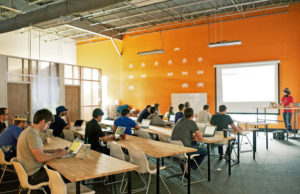Over the last five years, handfuls of specialty schools offering software development training courses have launched to help meet the booming demand for tech talent worldwide. At the same time, these platforms, both brick-and-mortar, online and hybrid-style, have promised to help college graduates land steady, high-paying jobs at prominent tech companies constituting the new digital economy.
The rapid expansion of “coding bootcamps” took off about five years ago, with programs lasting an average of three months at a cost of approximately $11,451, according to data from Course Report. In 2016, the number of bootcamp providers operating in the U.S. grew from 67 the previous year to 91. In 2017, coding schools are projected to graduate nearly 23,000 students, about half as many as all accredited colleges and universities combined. Since 2012, the number of coding school graduates have mushroomed 10x, as the $260 million industry is poised to continue its rapid growth.
As coding schools offer college graduates from a range of backgrounds the opportunity to switch career paths, they are particularly attractive to mobility-seeking Millennials who decide they do not necessarily want to practice what they specialized in during their time at university. Moving forward, code bootcamps are expected to employ more of a “risk-sharing” tuition model, wherein students pay no tuition but sign Income Share Agreements requiring them to pay back the coding school a fixed percentage of their next job’s salary.
Coding bootcamps range from free to tens of thousands of dollars, with some offering on-campus courses and other providing completely digital classroom solutions. Despite the rapid growth of the industry, a major shakeup is occurring as schools shut down and the number of leading organizations narrows down. Galvanize, a Denver-based network of modern, urban campuses recently laid off 10% of its workforce, while Dev Bootcamp and Iron Yard, backed by Kaplan and Apollo Education Group, announced plans to shut down. While the shakedown continues, edtech, with coding boot camps as a main segment, will continue to receive waves of funding, while investors may become more focused on results-driven organizations.
























